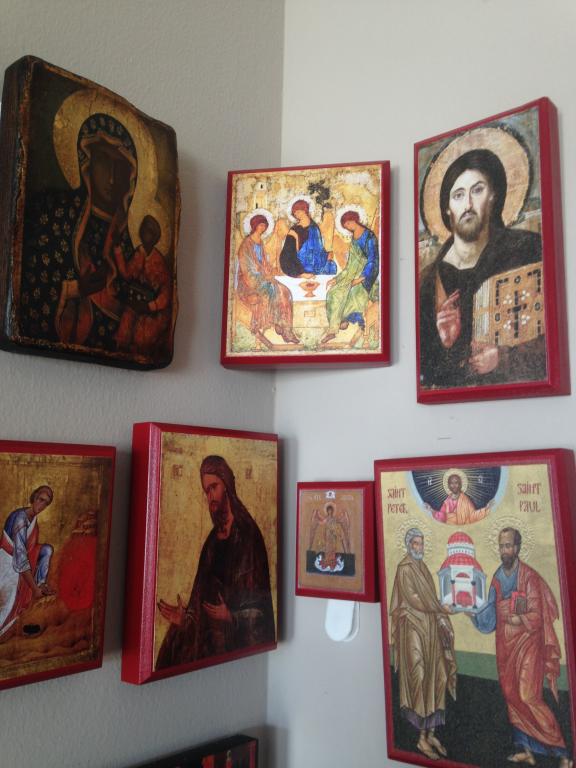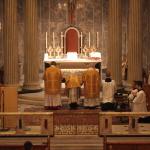
When You had fulfilled Your plan for us and united things on earth with those in heaven, You ascended in glory, O Christ our God, in no way distant but remaining inseparable, You cried to those who love You: I am with You and there is none against You. (Kondak for Ascension Thursday).
When I visited my friend Julian Hayda’s apartment for the first time, I noticed in his icon corner that there was a cross literally suspended from the corner. I kept my observation to myself until I recently redid my own icon corner and wanted to hang something from the middle too: the iconographer Andrei Rublev’s Trinity. I messaged Julian for help. He responded that all it takes is a nail in the corner.
As you may surmise from this story, I am not the most handy of persons in my temple. In fact, Julian says that one day he’ll show me how to suspend a cross from the corner like he did; that takes two nails. That I have to be shown, though, speaks to how much I need the church for the simple, everyday things of life. It is also at that level that the Kyivan Church in her wisdom asks us to contemplate the passage from St John’s Gospel today for the first of our Mission Days, in the first eleven verses of the fourteenth chapter, alongside Rublev’s icon of the Trinity.
There, our Lord Jesus Christ tells his disciples that he is going to prepare a place for them, that they will be with him with his Father in the age to come. The Holy Apostle Thomas – significant to me because it was arguably through his intercession that I joined the Eastern Catholic Church – asks the Lord how they would get there if they didn’t even know the way. Jesus replies in the words that evangelical Protestants love to take out of context, I am the way and the truth and the life; no one comes to the Father except through me. What Jesus is saying is that it is in communion with him that we, like him, enter the bosom of the Father, that as he ascends into glory, so too we are baptized in his risen life and are filled with the Holy Spirit. Indeed, we also learn this truth from today’s reading in the Acts of the Apostles (19.1-8) when the Holy Apostle Paul finds disciples of John the Forerunner and Baptist and asks them whether they had received the Holy Spirit. When they reply that they didn’t even know that there was a Holy Spirit, Paul proclaims to them the death and resurrection of Jesus Christ, and when they are baptized into that life, the Spirit descends upon them immediately. Jesus Christ is the way, the truth, and the life because the Spirit joins us into communion with him, who has ascended to the bosom of the Father. In this way, the Lord then replies to the Holy Apostle Philip, who asks him to show them the Father. The Lord says that whoever has seen the Son has seen the Father; what is more, the Son is in the Father and the Father is in the Son.
This is deep stuff, and for those who know our Kyivan Church, we are a people with a deep theology but a shallow and colonized mentality. Unlike our evangelical counterparts who will respond with blazing enthusiasm to these amazing insights, it is more likely that ours will say whatever and just get on with their everyday lives. Indeed, I am in this church realizing that this too would be my response. I am, in other words, among the people who would say whatever.
Here, the Kyivan Church is truly pastoral. They bring the insights here to our everyday lives. They ask us to ‘show our love to our family members through some unexpected gesture or good deed,’ suggesting that perhaps for all the talk about the family being a basic unit of a society that builds a civilization of love, we often fall short – that is why the good deeds are unexpected. We are to ‘go to church always greeting one another’ – which means that often times we don’t – and we are to ‘let those who live alone experience our brotherly and sisterly love.’What’s more, we are also to ‘discretely give a compliment to three strangers: at work, while shopping, while taking a train or a bus, or just in our neighbourhood.’ Almost channeling the urban theorist Jane Jacobs, those of us who think that the metaphysical stuff of the Father and Son being in each other is too highfalutin are invited to practice the works of love by building everyday social capital. Indeed, when I read these prescriptions, I immediately thought of how I asked Julian how to get icons into the corner space because I am not handy: such questions can be annoying to the other, unless our relation is marked by love at the level of the everyday.
These everyday works may appear shallow, but as my spiritual father has often reminded me while directing my erratic prayer life, sometimes we need to be tricked into prayer. The Kyivan Church in her pastoral wisdom is showing us how to meditate on John’s Gospel: it is by implementing deeds that may seem a little corny and insignificant. In so doing, we are tricked into realizing what the source of love is: Jesus Christ in the bosom of the Father. Driving home the point, they also quote Pope Francis, the hierarch of the church that presides over the churches in charity, as he says that the ‘law of the People of God’ is ‘love’ that is ‘not sterile sentimentality or something vague, but the acknowledgement of God as the one Lord of life and, at the same time, the acceptance of the other as my true brother, overcoming division, rivalry, misunderstanding, selfishness; these things go together.’ As if the Spirit wanted to reinforce this insight, the bishops of the Latin Church in Chile have resigned en masse today, cut to the heart as they are for mishandling the sex abuse crisis and misreporting it to the Bishop of Rome to the embarrassment of the entire Church and the re-victimization of already-traumatized victims. Their failure was not a merely legal one. It was a violation of the law of love in their actions, and for that failure, the only recourse is to take another practice: to resign and to beg for mercy from the bishop of the church that presides over the churches in charity.
With these multiple scales in mind, we come to understand why the icon that the Kyivan Church has prescribed for our contemplation on this first Mission Day is Rublev’s Trinity. Communion with the Holy Trinity is the source of our works of love, from the everyday level of building social capital that may seem shallow to the upper echelons of ecclesial politicking. Rublev’s Trinity invites us to sit at table with the Holy Trinity, to be filled with the Spirit that we may meet the Father through the Son who shows him to us. Let me sit here today before the Lord by whose Ascension the practices of charity are made possible. Our Kyivan Church echoes the words of St Augustine as today’s meditation quotes him from the opening of the Confessions: ‘Our heart is restless until it finds rest in You, O Lord.’ Without that rest – that hesychastic stillness – my heart cannot love and so cannot join in the fullness of the Lord’s creation of the world in love. I ask to be able to be still, to be in the love that the Lord invites me into, that I may live my vocation to love in the world ultimately created and therefore constituted by love.
Today is the first of ten Mission Days in the Kyivan Church from Ascension to Pentecost.












